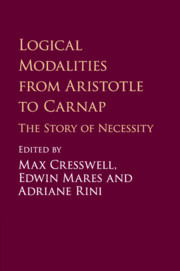Book contents
- Frontmatter
- Contents
- List of Figures and Tables
- List of Contributors
- List of Abbreviations
- Introduction
- 1 Aristotle on the Necessity of the Consequence
- 2 Aristotle on One- Sided Possibility
- 3 Why Does Aristotle Need a Modal Syllogistic?
- 4 Necessity, Possibility, and Determinism in Stoic Thought
- 5 Necessity in Avicenna and the Arabic Tradition
- 6 Modality without the Prior Analytics: Early Twelfth Century Accounts of Modal Propositions
- 7 Ockham and the Foundations of Modality in the Fourteenth Century
- 8 Theological and Scientific Applications of the Notion of Necessity in the Mediaeval and Early Modern Periods
- 9 Locke and the Problem of Necessity in Early Modern Philosophy
- 10 Leibniz's Theories of Necessity
- 11 Leibniz and the Lucky Proof
- 12 Divine Necessity and Kant's Modal Categories
- 13 Charles Sanders Peirce on Necessity
- 14 The Development of C. I. Lewis's Philosophy of Modal Logic
- 15 Carnap's Modal Predicate Logic
- Bibliography
- Index
7 - Ockham and the Foundations of Modality in the Fourteenth Century
Published online by Cambridge University Press: 05 September 2016
- Frontmatter
- Contents
- List of Figures and Tables
- List of Contributors
- List of Abbreviations
- Introduction
- 1 Aristotle on the Necessity of the Consequence
- 2 Aristotle on One- Sided Possibility
- 3 Why Does Aristotle Need a Modal Syllogistic?
- 4 Necessity, Possibility, and Determinism in Stoic Thought
- 5 Necessity in Avicenna and the Arabic Tradition
- 6 Modality without the Prior Analytics: Early Twelfth Century Accounts of Modal Propositions
- 7 Ockham and the Foundations of Modality in the Fourteenth Century
- 8 Theological and Scientific Applications of the Notion of Necessity in the Mediaeval and Early Modern Periods
- 9 Locke and the Problem of Necessity in Early Modern Philosophy
- 10 Leibniz's Theories of Necessity
- 11 Leibniz and the Lucky Proof
- 12 Divine Necessity and Kant's Modal Categories
- 13 Charles Sanders Peirce on Necessity
- 14 The Development of C. I. Lewis's Philosophy of Modal Logic
- 15 Carnap's Modal Predicate Logic
- Bibliography
- Index
Summary
Prologue
There was a very considerable development of modal logic within the mediaeval Latin tradition both before and rather soon after the translation of Aristotle's Prior Analytics. The subject was explored, largely without benefit of the Prior Analytics, by Abelard and his generation and with the Prior Analytics in hand by Kilwardby and his. By the early fourteenth century we find a good deal of reflection on just what was involved in a modal logic. In particular by this time there are a well-developed propositional logic and a well-developed syllogistic and the question of how modality interacted with each could be and was posed directly. In this chapter I hope first to present a sketch of the semantic and metaphysical foundation of modality as it appeared in the first half of the fourteenth century and then some of the nuts and bolts of modal logic as it was developed by Ockham.
Part I. The Foundation
Something between a Fable and a Fact
Once upon a time, perhaps by the mid- to late thirteenth century, the concept of possibility was intimately connected with that of power – some state of affairs was thought possible just in case it was thought there was some agent who could bring it about. For adherents of the Abrahamic religions the chief among these agents was an omnipotent God. Exactly what omnipotence meant is not entirely clear (it does not seem to require that God be able to make it true that Adam freely eats forbidden fruit, for example) but it at least entailed that if any agent could make or destroy a thing then God could make or destroy that thing. For the Latin West this picture had already been given a vivid and interesting formulation by Anselm of Canterbury and it had been developed in some earlier thirteenth century thinkers, Robert Grosseteste, for example. It remained central until the middle of the fourteenth century when a number of writers, Thomas Bradwardine and Gregory of Rimini notable among them, launched us on a path which broke the connection between possibility and power and eventually replaced it with a conception of possibility as a semantic or logical matter.
- Type
- Chapter
- Information
- Logical Modalities from Aristotle to CarnapThe Story of Necessity, pp. 133 - 153Publisher: Cambridge University PressPrint publication year: 2016
- 4
- Cited by



